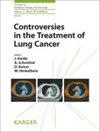Controversies in the treatment of advanced stages of small cell lung cancer.
Frontiers of Radiation Therapy and Oncology
Pub Date : 2010-01-01
Epub Date: 2009-11-24
DOI:10.1159/000262476
引用次数: 8
Abstract
Small cell lung cancer is a highly proliferative tumor with the potential of early hematogeneous spread. At the time of first diagnosis more than 80% of patients present with distant metastases. Although response rate to chemotherapy is high with > 50% confirmed objective responses, the majority of patients relapse within several months after first-line chemotherapy. The combination of cisplatin plus etoposide has become standard chemotherapy. In contrast to early stages, equal efficacy of cisplatin and carboplatin in combination with etoposide has been suggested in advanced disease in two randomized trials in the 1990s. Newer agents like the topoisomerase I inhibitors topotecan and irinotecan have been investigated for first line treatment. Two phase III studies demonstrated similar efficacy of topotecan when compared to etoposide. Results of first line therapy with irinotecan are more contradictory. A first trial demonstrated superiority of irinotecan/cisplatin over etoposide/cisplatin in a Japanese population. However, two subsequent North American phase III trials showed equivalent efficacy. Recently a Scandinavian phase III trial found superiority of irinotecan/carboplatin over etoposide/carboplatin. Prophylactic cranial irradiation (PCI) after first line chemotherapy has become standard of care in advanced stages, because a randomized phase III trial of the EORTC demonstrated a survival benefit. Second-line therapy in relapsed disease improves survival. A randomized trial showed similar efficacy of topotecan when compared to anthracyline containing chemotherapy, with an improvement of cancer related symptoms in the topotecan arm.晚期小细胞肺癌治疗的争议。
小细胞肺癌是一种高度增殖的肿瘤,具有早期同质扩散的潜力。在首次诊断时,超过80%的患者出现远处转移。虽然化疗有效率高,确认客观反应> 50%,但大多数患者在一线化疗后几个月内复发。顺铂联合依托泊苷已成为标准的化疗方案。与早期相比,20世纪90年代的两项随机试验表明,在晚期疾病中,顺铂和卡铂联合依托泊苷的疗效相同。较新的药物如拓扑异构酶I抑制剂拓扑替康和伊立替康已被研究用于一线治疗。两项III期研究表明,与依托泊苷相比,拓扑替康的疗效相似。伊立替康一线治疗的结果比较矛盾。在日本人群中首次试验证明伊立替康/顺铂优于依托泊苷/顺铂。然而,随后的两项北美III期试验显示出相同的疗效。最近一项斯堪的纳维亚III期试验发现伊立替康/卡铂优于依托泊苷/卡铂。一线化疗后预防性颅脑照射(PCI)已成为晚期患者的标准治疗,因为EORTC的一项随机III期试验显示了生存益处。复发性疾病的二线治疗可提高生存率。一项随机试验显示,与蒽环类药物化疗相比,拓扑替康的疗效相似,拓扑替康组的癌症相关症状得到改善。
本文章由计算机程序翻译,如有差异,请以英文原文为准。
求助全文
约1分钟内获得全文
求助全文

 求助内容:
求助内容: 应助结果提醒方式:
应助结果提醒方式:


